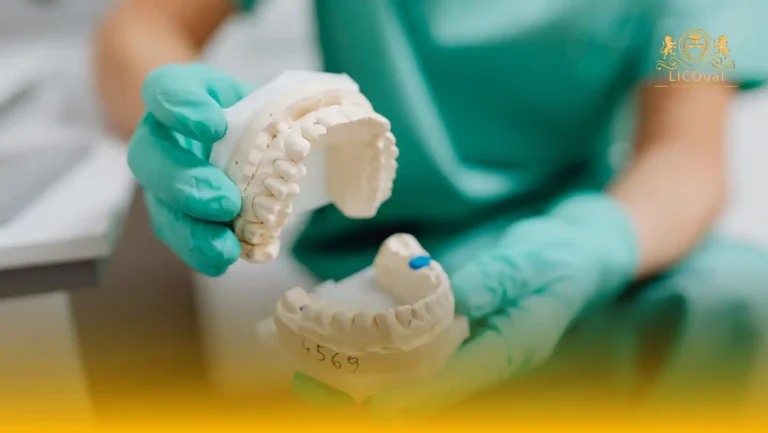The LICQual Level 3 Diploma in Ambulatory Care Pharmacy (Dip Ambulatory Care Pharmacy) is a specialized qualification designed for professionals who are committed to advancing their knowledge, developing their expertise, and enhancing their career opportunities within the dynamic field of pharmacy. With an emphasis on practical application and Continuing Professional Development (CPD), this diploma equips learners with the essential skills required to provide high-quality pharmaceutical care in ambulatory and outpatient settings.
This qualification prepares learners to respond effectively to the growing demands of modern healthcare, where ambulatory care plays a critical role in patient treatment and support. The programme focuses on key areas such as patient-centred care, medication therapy management, clinical decision-making, and evidence-based practice, ensuring that learners are well-prepared to deliver effective pharmaceutical interventions in real-world healthcare environments. By completing this diploma, learners can strengthen their professional profile, broaden their career prospects, and contribute meaningfully to patient safety and improved healthcare outcomes.
Centres delivering the LICQual Level 3 Diploma in Ambulatory Care Pharmacy are required to uphold the highest standards of training and assessment. This includes having competent and qualified staff with the necessary expertise to guide learners throughout their studies. In addition, centres must provide access to all essential learning materials, resources, and support systems to ensure that learners can achieve success and meet the rigorous standards of the qualification.
With its focus on professional growth, practical skills, and CPD, this diploma serves as a valuable pathway for those looking to advance their career in pharmacy while making a positive impact within the healthcare sector.
Course Overview
Qualification Title
LICQual Level 3 Diploma in Ambulatory Care Pharmacy (Dip Ambulatory Care Pharmacy)
Total Units
6
Total Credits
60
GLH
240
Qualification #
LICQ2201170
Qualification Specification
To enroll in the LICQual Level 3 Diploma in Ambulatory Care Pharmacy (Dip Ambulatory Care Pharmacy), applicants must meet the following criteria:
|
Qualification# |
Unit Title |
Credits |
GLH |
|---|---|---|---|
|
LICQ2201170-1 |
Principles of Ambulatory Care Pharmacy |
10 |
40 |
|
LICQ2201170-2 |
Patient-Centred Care and Communication |
10 |
40 |
|
LICQ2201170-3 |
Pharmacotherapy in Ambulatory Care |
10 |
40 |
|
LICQ2201170-4 |
Clinical Decision-Making and Evidence-Based Practice |
10 |
40 |
|
LICQ2201170-5 |
Medication Therapy Management and Safety |
10 |
40 |
|
LICQ2201170-6 |
Professional Development and Research in Pharmacy |
10 |
40 |
By the end of this course, learners will be able to:
Unit 1: Principles of Ambulatory Care Pharmacy
By the end of this unit, learners will be able to:
- Explain the role and scope of ambulatory care pharmacy within healthcare systems.
- Analyse the differences between inpatient, outpatient, and community pharmacy practices.
- Identify the pharmacist’s responsibilities in managing patient care in ambulatory settings.
- Evaluate the challenges and opportunities of providing pharmaceutical care outside hospital settings.
Unit 2: Patient-Centered Care and Communication
By the end of this unit, learners will be able to:
- Demonstrate effective communication and counselling techniques to support patient understanding.
- Apply strategies for shared decision-making in pharmacy practice.
- Evaluate cultural, social, and ethical considerations in delivering patient-centred care.
- Develop approaches to enhance trust, adherence, and long-term patient engagement.
Unit 3: Pharmacotherapy in Ambulatory Care
By the end of this unit, learners will be able to:
- Describe therapeutic approaches for managing chronic conditions such as diabetes, hypertension, and asthma.
- Analyse the use of pharmacotherapy in treating acute conditions commonly seen in outpatient care.
- Evaluate drug interactions, contraindications, and side effects in ambulatory care.
- Apply clinical guidelines to optimise medication therapy and improve patient outcomes.
Unit 4: Clinical Decision-Making and Evidence-Based Practice
By the end of this unit, learners will be able to:
- Demonstrate critical thinking in clinical pharmacy decision-making.
- Evaluate scientific research and clinical guidelines to support evidence-based care.
- Apply risk-benefit analysis when recommending drug therapies.
- Integrate patient data, medical history, and evidence to make safe and effective clinical decisions.
Unit 5: Medication Therapy Management and Safety
By the end of this unit, learners will be able to:
- Identify strategies to optimise medication use and minimise errors in ambulatory settings.
- Analyse common causes of medication-related problems and adverse drug events.
- Apply monitoring and follow-up processes to ensure safe medication use.
- Evaluate the impact of medication therapy management programmes on patient safety and healthcare quality.
Unit 6: Professional Development and Research in Pharmacy
By the end of this unit, learners will be able to:
- Demonstrate skills in research design, data collection, and critical analysis within pharmacy practice.
- Critically appraise literature relevant to ambulatory care and pharmacotherapy.
- Develop and maintain a Continuing Professional Development (CPD) portfolio.
- Reflect on professional responsibilities, ethical practice, and lifelong learning in pharmacy.
The LICQual Level 3 Diploma in Ambulatory Care Pharmacy (Dip Ambulatory Care Pharmacy) is designed for learners who want to specialize in outpatient care, chronic disease management, and advanced pharmacy practice. This internationally accredited qualification is ideal for pharmacists, nurses, healthcare professionals, graduates, and policy makers who want to strengthen their expertise in ambulatory care pharmacy and patient safety. Whether you are starting your career or advancing into leadership roles, this diploma equips you with the skills, recognition, and confidence to succeed in the growing field of ambulatory care pharmacy.
1. Pharmacists and Pharmacy Technicians
- Pharmacists aiming to specialize in ambulatory care and outpatient pharmacy services
- Pharmacy technicians seeking accredited qualifications in medication management for chronic conditions
- Professionals wanting to reduce risks in outpatient drug therapy and patient monitoring
- Staff preparing for roles in hospital outpatient departments and community pharmacy services
- Learners interested in international standards for ambulatory care medication safety
2. Nurses and Clinical Healthcare Staff
- Nurses aiming to improve patient safety in outpatient and ambulatory care settings
- Clinical staff seeking practical skills in chronic disease management and medication adherence
- Professionals wanting to strengthen knowledge of drug interactions in outpatient care
- Learners preparing for supervisory or quality assurance roles in ambulatory clinics
- Staff aiming to contribute to safer healthcare delivery systems for outpatient patients
3. Healthcare Professionals Focused on Outpatient Care
- Doctors and practitioners specializing in ambulatory medicine and chronic disease management
- Professionals seeking accredited qualifications in outpatient patient care
- Staff wanting to enhance evidence‑based practice in ambulatory care pharmacy
- Individuals aiming to expand career opportunities in hospitals and outpatient facilities
- Healthcare workers preparing for leadership roles in ambulatory healthcare
4. Graduates in Life Sciences and Medicine
- Students with degrees in medicine, nursing, or pharmacy
- Fresh graduates seeking specialized training in ambulatory care pharmacy
- Learners aiming to boost employability with accredited qualifications
- Individuals preparing for careers in outpatient care and healthcare quality assurance
- Graduates interested in international healthcare and pharmaceutical ambulatory care standards
5. Pharmaceutical Industry Professionals
- Employees working in drug manufacturing and development for outpatient care
- Clinical trial coordinators seeking knowledge of ambulatory medication protocols
- Staff aiming to strengthen compliance with global outpatient drug safety regulations
- Professionals preparing for leadership roles in pharmaceutical ambulatory care research
- Individuals wanting to integrate outpatient care into drug development processes
6. Policy Makers and Regulatory Authorities
- Professionals working in healthcare policy and regulation
- Staff involved in drug approval and compliance processes for outpatient care
- Individuals aiming to strengthen expertise in international ambulatory care pharmacy standards
- Learners preparing for advisory or consultancy roles in healthcare quality
- Policy makers seeking deeper knowledge of outpatient medication safety frameworks
7. Career Changers Entering Ambulatory Care Pharmacy
- Professionals from other industries transitioning into healthcare and pharmacy
- Individuals seeking a structured pathway into ambulatory care medication management
- Learners aiming to gain practical, job‑ready skills quickly
- Career changers motivated by opportunities in outpatient care and pharmacy practice
- Those wanting internationally recognized qualifications to boost employability
Centres intending to deliver the LICQual Level 3 Diploma in Ambulatory Care Pharmacy (Dip Ambulatory Care Pharmacy) must meet specific standards to ensure high-quality training, learner success, and compliance with international best practices. The following requirements must be in place:
- Qualified and Competent Staff
- Centres must employ experienced and professionally qualified trainers, tutors, and assessors with expertise in pharmacy, clinical practice, and ambulatory care.
- Staff should demonstrate both academic knowledge and real-world professional experience to ensure effective teaching and assessment.
- Access to Learning Resources
- Centres must provide updated and comprehensive study materials, digital resources, and reference texts to support effective learning.
- Facilities should include access to case studies, clinical examples, and technology to enrich the learner experience.
- Assessment and Quality Assurance
- A robust internal quality assurance system must be in place to ensure fairness, transparency, and consistency in assessment.
- Internal verifiers must be qualified and capable of maintaining assessment standards in line with LICQual requirements.
- Learner Support and Guidance
- Centres must provide academic support, guidance, and mentoring throughout the course.
- Clear learner policies on equality, diversity, inclusion, and safeguarding must be in place to promote fair opportunities for all.
- Commitment to Professional Development
- Centres must ensure staff engage in ongoing Continuing Professional Development (CPD) to maintain teaching excellence.
- Training delivery should reflect current practices and global standards in ambulatory care pharmacy.
- Facilities and Infrastructure
- Centres must provide safe, accessible, and well-equipped environments for teaching and assessments.
- Reliable IT systems and online learning platforms should be available to support both classroom-based and blended learning delivery.
Assessment and Verification
All units within this qualification are subject to internal assessment by the approved centre and external verification by LICQual. The qualification follows a criterion-referenced assessment approach, ensuring that learners meet all specified learning outcomes.
To achieve a ‘Pass’ in any unit, learners must provide valid, sufficient, and authentic evidence demonstrating their attainment of all learning outcomes and compliance with the prescribed assessment criteria. The Assessor is responsible for evaluating the evidence and determining whether the learner has successfully met the required standards.
Assessors must maintain a clear and comprehensive audit trail, documenting the basis for their assessment decisions to ensure transparency, consistency, and compliance with quality assurance requirements.







